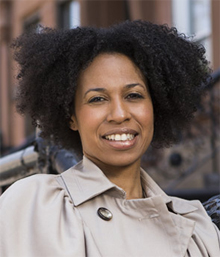Dr. Aletha Maybank on injustice in health care
CBS News asked noted figures in the arts, business and politics about their experience in today's civil rights movement, or about figures who inspired them in their activism.
Dr. Aletha Maybank, Assistant Commissioner of the New York City Department of Health and Mental Hygiene
Is there something that you'd like to share about your personal connection to civil rights issues?
Even though not yet born, the lens through which I guide my work as a physician stems directly from understanding the foundation of the civil rights movement. In 1966 at the convention of the Medical Committee for Human Rights, Dr. Martin Luther King, Jr. spoke to the group of activists: "Of all the forms of inequality, injustice in health care is the most shocking and inhuman."
Fast forward 50 years to 2014, we will find that the nation's leading public health agency, the Centers for Disease Control Prevention (CDC), states on their website that "health disparities affecting African Americans are striking and are apparent." These differences in healthcare and the health of our people still persist and are unjust, avoidable and unnecessary.
Dr. King's words from 1966 have become the guiding mantra for many of us in health professions striving for justice and health for all. As health professionals, the way in which we "fight" for justice is important, and we must do it collectively. Collectiveness in idea and action was a key element for progression and success during the civil rights movement, and it will be absolutely necessary to transform communities towards achieving equity in health. We have all heard about the importance for equitable access to health insurance or services through the passage of the Affordable Care Act. Our health, however, is greatly determined by more than what happens in a doctor's office or the hospital, but rather where we live, work, play and pray. Our individual choices in health are a reflection of the community conditions we live in and what resources we have access to.
Therefore, the pursuit for optimal health cannot be separated from fundamental issues facing our communities, such as feelings of powerlessness caused by racism and all types of discrimination, as well as issues of limited and unequal access to resources, safe neighborhoods, healthy food, adequate housing, quality education, good paying jobs, and less stressful environments.
In order to fully achieve equity in health, we must step out of our comfortable silos of focus, move beyond isolated conversations about our healthcare system, and recognize that policies affecting jobs, income, education, housing, incarceration, and the environment are all policies for health. By working together -- and only by working together across sectors of professionals -- will we succeed at improving the health and lives of all that we serve.
For more info:
- dralethamaybank.com
- Follow Dr. Aletha Maybank on Twitter, Facebook and Instagram
